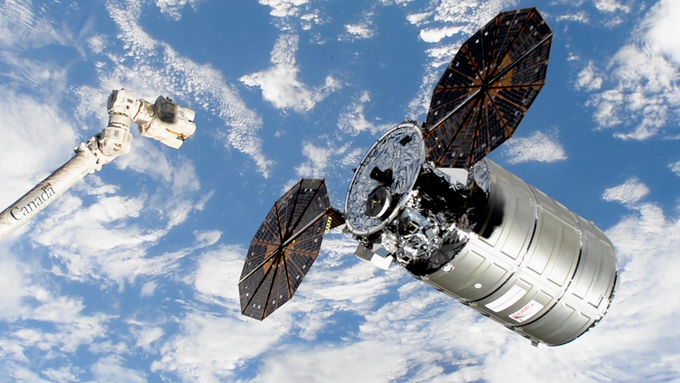November 27, 2025 | 07:54 GMT +7
November 27, 2025 | 07:54 GMT +7
Hotline: 0913.378.918
November 27, 2025 | 07:54 GMT +7
Hotline: 0913.378.918

The US Cygnus cargo spacecraft will carry IAEA and FAO seeds to the International Space Station. Photo: NASA
The International Atomic Energy Agency (IAEA) and the Food and Agriculture Organization of the United Nations (FAO) launched seeds into space today as they intensify their joint efforts to develop new crops able to adapt to the ravages of climate change here on Earth.
The seeds from the IAEA and FAO agriculture and biotechnology laboratories are travelling to the International Space Station just as leaders meet at the UN Climate Change Conference COP 27 in Sharm El Sheikh to discuss pressing environmental challenges, including the significant impact of the climate crisis on the world’s agrifood production systems.
“Nuclear science once again is showing us its extraordinary capability to tackle climate change,” IAEA Director General Rafael Mariano Grossi said. “I am hopeful this experiment will bring about breakthroughs: results that we share freely with scientists and new crops that help farmers adapt to climate change and boost food supplies.”
FAO Director-General QU Dongyu said: “The world’s millions of smallholder farmers urgently require resilient, high-quality seeds adapted to increasingly challenging growing conditions. Innovative science like space breeding of improved crop varieties can help pave the road to a brighter future of better production, better nutrition, a better environment, and a better life.”
Seeds of Arabidopsis, a plant commonly used in genetic experiments due to its unique features, and Sorghum, a nutrient-packed grain used for food for humans, animal feed, and ethanol, will be exposed inside and outside of the International Space Station for approximately three months to conditions prevailing in space, primarily microgravity, a complex mixture of cosmic radiation and extreme low temperatures.
Upon their return, scientists at the Joint FAO/IAEA Centre of Nuclear Techniques in Food and Agriculture will grow and screen them for useful traits to better understand space-induced mutations of plant seeds – a technique known as space mutagenesis – and identify new varieties able to adapt to changing terrestrial conditions associated with climate change.
According to the IPCC Special Report on Climate Change and Land, the stability of the world’s food supply will decrease in the future, severely affecting its most vulnerable people. The new crop varieties from space could help farmers and decision makers, who need to make substantial changes and investments in adapting to a changing climate, to sustain production and food quality.
The ongoing experiment is based on almost 60 years of experience of the Joint FAO/IAEA Centre in inducing mutations in plants and thereby speeding up their breeding with the help of radiation to develop new agricultural crop varieties. So far, more than 3,400 mutant varieties of more than 210 plant species that were developed using induced genetic variation and mutation breeding – including numerous food crops, ornamentals and trees – have officially been released for commercial use in 70 countries.
This experiment will be the first time the IAEA and FAO conduct genomic and biological analyses of seeds exposed to space mutagenesis. At the International Space Station, the seeds will be exposed to unique conditions that cannot be reproduced in a laboratory on Earth. One goal of the experiment is also to compare such seeds with the ones exposed to radiation in laboratory conditions to study DNA and growth effects.
This project will be part of the IAEA and FAO portfolio of climate change projects aimed at helping countries adapt to new climate realities, including food and water shortages and biodiversity losses, through nuclear science and technology. At COP27, the IAEA and the FAO will organize an event on 15 November to highlight how joint energy, food and water resource planning and management can contribute to climate-resilient development. More information about the event is available here.
Last week, the two organizations also agreed to intensify their collaborations in food and agriculture using nuclear science and technology. Directors General Grossi and Qu signed a Memorandum of Understanding on 31 October to increase innovative research and development to help countries achieve the UN Sustainable Development Goals. New work envisaged include other key areas such as the ocean, the environment, water resources and nutrition.
(FAO.org)

(VAN) A new study reveals how the simultaneous effects of ocean acidification, salinity and loss of oxygen are making the world more fragile.

(VAN) Hopes are growing that the creation of the first 3D turkey gut model could be a turning point in the battle against the virulent blackhead disease.

(VAN) Tyson, America’s biggest meat supplier, plans to shutter one of its largest beef processing plants as the industry continues to struggle with low cattle supplies and political pressure from Washington.

(VAN) New FAO study shows how digital solutions are empowering farmers and fishers to prevent losses and build resilient agrifood systems.

(VAN) Brazil's COP30 presidency pushed through a compromise climate deal on Saturday that would boost finance for poor nations coping with global warming but that omitted any mention of the fossil fuels driving it.

(VAN) Poultry farmers in the UK have been warned that they could face one of the worst winters yet for bird flu.

(VAN) Prices of main-crop paddy have risen sharply, with jasmine rice hitting 16,100 baht per tonne — the highest level in years.